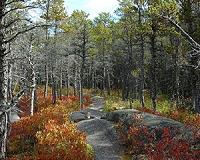| . |  |
. |
Kabul (AFP) Jan 24, 2011 Afghan President Hamid Karzai on Monday accused NATO-led forces fighting an Islamic insurgency in his country of illegally cutting down thousands of trees. The US-backed leader said Western troops, part of a 140,000-strong US-led force deployed to Afghanistan to fight the Taliban, had chopped down up to 4,000 trees in Ghazni, a troubled province in the southeast. "The president in condemning this act emphasises to the international forces that they must avoid such action, which is a crime against Afghanistan's public properties and destroys the environment," his office said in a statement. However, Lieutenant Colonel John Dorrian, a spokesman for NATO's International Security Assistance Force (ISAF) dismissed the claims. "We looked at that (and) we found no operational report to support that allegation," he told AFP. Afghanistan has been at war for the past three decades and has lost many of its natural resources, including once-thriving woodland. Karzai's office issued the statement as negotiations continued with lawmakers to resolve a row over the opening of parliament which threatens to boil over into a constitutional crisis.
earlier related report With Africa and South American alone losing 7.4 million hectares (18.3 million acres) of forest a year, the International Union of Forest Research Organizations (IUFRO) said a drastic change of policy is needed by the United Nations and governments. Sixty international experts said in the report, to be presented at a UN forum this week, that too much attention is being put on forests as a store of carbon dioxide, the main gas blamed for global warming. Deforestation accounts for about a quarter of the global greenhouse gas emissions each year which are blamed for rising temperatures. Live trees act as a sponge for carbon but give it off when they decay or are burned. "Our findings suggest that disregarding the impact on forests of sectors such as agriculture and energy will doom any new international efforts whose goal is to conserve forests and slow climate change," said Jeremy Rayner of the University of Saskatchewan and chairman of the IUFRO report panel. Even the most recent UN backed initiative, Reducing Deforestation in Developing countries (REDD) is criticized because the panel said it seeks a single global solution. The experts said that REDD and other international accords should concentrate on helping known as REDD, should focus more on supporting regional and national efforts to save the forests at risk. "Unless all sectors work together to address the impact of global consumption, including growing demand for food and biofuels, and problems of land scarcity, REDD will fail to arrest environmental degradation and will heighten poverty," said Constance McDermott of Oxford University's Environmental Change Institute. The experts praised initiatives in Asia and Europe which they said should be copied elsewhere. The Association of Southeast Asian Nations (ASEAN) has developed a regional standard for monitoring illegal logging and also set up a special system for forest-related research. "The hope is that such a process will allow decision-makers to learn from the mistakes of the past," said the IUFRO report. Among other "bright spots", IUFRO pointed to a US law which makes it illegal to import wood known to come from stolen timber. The European Union is making a similar effort to halt illegal wood imports through "due diligence" investigations, which has led to partnerships with major exporters such as Cameroon. Brazil, long the target of an international campaign to reverse its forest destruction, has enacted new environmental and policy reforms that have the potential to slow forest loss in the Amazon Basin, IUFRO said. The report is to be presented to the UN Forum on Forests this week as part of the launch of the International Year of Forests.
Share This Article With Planet Earth
Related Links Forestry News - Global and Local News, Science and Application
 Forest accords not saving trees, experts
Forest accords not saving trees, expertsNew York (AFP) Jan 23, 2011 International accords on saving vulnerable forests are having little impact because they do not attack the core causes such as growing demand for biofuels and food crops, a new report said Sunday. With Africa and South American alone losing 7.4 million hectares (18.3 million acres) of forest a year, the International Union of Forest Research Organizations (IUFRO) said a drastic change of pol ... read more |
|
| The content herein, unless otherwise known to be public domain, are Copyright 1995-2010 - SpaceDaily. AFP and UPI Wire Stories are copyright Agence France-Presse and United Press International. ESA Portal Reports are copyright European Space Agency. All NASA sourced material is public domain. Additional copyrights may apply in whole or part to other bona fide parties. Advertising does not imply endorsement,agreement or approval of any opinions, statements or information provided by SpaceDaily on any Web page published or hosted by SpaceDaily. Privacy Statement |